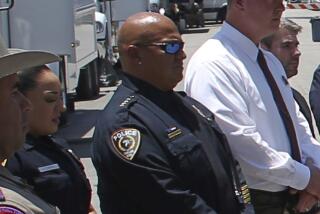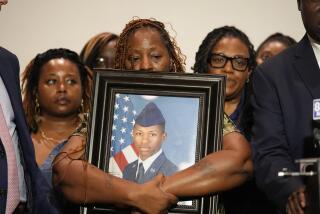First-degree manslaughter charges filed against Tulsa police officer who shot and killed Terence Crutcher

WARNING: This video contains graphic content. Tulsa police released several police car and helicopter videos after Terence Crutcher, an unarmed 40-year-old black man, was fatally shot by a white police officer.
Reporting from TULSA, Okla. — Prosecutors in Tulsa, Okla., moved swiftly to file first-degree manslaughter charges Thursday against a white policewoman who fatally shot an unarmed black man who had been stranded in his disabled SUV.
The unusual felony charges were filed less than a week after 40-year-old Terence Crutcher was shot on a stretch of darkened highway after officers stopped to investigate. A father of four, Crutcher was returning from a community college class when he was approached by first one, and eventually four police officers.
Police Officer Betty Shelby told interviewers she was afraid Crutcher was going to kill her. But an investigator concluded that Crutcher was walking away with his hands up. When he did not respond to her verbal commands to stop, the investigator said, Shelby became “emotionally involved to the point that she overreacted.”
The fatal shooting has quickly become part of the growing list of police shootings that has set the tone for the nation’s conversation on race relations.
Since the fatal shooting of Michael Brown in Ferguson, Mo., in 2014, the string of officer-involved shootings has given visibility and momentum to the Black Lives Matter movement, renewed debate over proper police training and added sharp edges to the presidential campaign.
As Shelby was being charged, members of the Congressional Black Caucus in Washington stood outside the Department of Justice and demanded a stronger, tougher response from Atty. Gen. Loretta Lynch to repeated instances of police shooting black men.
“We must do something to end this assault on our communities,” said Rep. Maxine Waters, the veteran Los Angeles Democrat. “We will not continue to ask our constituents to be patient without any hope for change.”
Tulsa County Dist. Atty. Steve Kunzweiler appeared determined to head off turmoil in a city with a long and fraught history of racial discord by establishing that the criminal justice system can work.
“I do not know why things happen in this world the way they do. We need to pray for wisdom and guidance on each of our respective paths in life,” he said.
The response from Crutcher’s family was muted.
Tiffany Crutcher, his twin sister, said the family was pleased with the manslaughter charge but would remain vigilant to see that there is a conviction.
“While we are pleased to learn that the officer that senselessly killed my brother will face criminal charges for doing this act, we understand that nothing will bring him back. Nothing will bring him back — our father, our son, our brother, our nephew, our cousin,” she said.
One of the family’s attorneys, Benjamin L. Crump, called for the case to be prosecuted vigorously.
“Make no mistake, it was clear from the beginning that charges were necessary in this case. The officer responsible for the death of Terence Crutcher had to be brought to justice to be held accountable for her actions. We remain optimistic that the state attorney will now do his job, and vigorously prosecute the officer to the fullest extent of the law, bringing some form of justice to the Crutcher family,” he said in a statement.
Shelby’s lawyer, Scott Wood, did not respond to requests for comment. But he has said the officer believed Crutcher was on a drug, and his failure to comply with her commands caused her to feel seriously threatened.
Citizen activists who had been demanding a response to the shooting applauded the prosecutors’ decision but remained suspicious.
“Sometimes I think they did this just to quiet things down,” said Dwana Gaston, one of a number of demonstrators outside the courthouse Thursday.
The swift decision to file criminal charges against a uniformed officer in Oklahoma stood in contrast to the smoldering discord in Charlotte, N.C., where the city’s police chief has refused to release police video of the fatal shooting of a black man who police say was armed. The family said it was a book, not a gun, the man was clutching when he was shot. The incident has drawn loud and violent street protests.
In releasing multiple videos of the fatal shooting in Tulsa, the city’s police chief advised that the images were “disturbing” and vowed to “achieve justice.”
Protesters quickly demanded that Shelby be fired, and the Crutcher family called for criminal charges against the officer, who remains on routine administrative leave. The Department of Justice has opened a civil rights investigation, and local authorities are independently investigating the shooting.
Police videos show Crutcher walking toward his SUV with his hands up. Four officers, three male and one female, approach Crutcher as he walks to the driver’s side and seems to lower his hands and put them on the car. A man in the helicopter video suggests it’s “time for a Taser” before saying, “That looks like a bad dude, too. Probably on something.”
Within seconds, Crutcher drops to the ground. “Shots fired!” a woman yells on police radio as officers slowly back away while holding their guns up. Officers wait more than two minutes before approaching Crutcher again.
Wood, Shelby’s lawyer, said that when the officer showed up and asked Crutcher whether the car was his, he did not respond. Crutcher put his hands in his pockets as he walked toward her, then removed them and put his hands up before walking toward the back of her patrol car and putting his hands back in his pockets, Wood said.
Wood said Shelby fired her gun at the same time that a second officer fired a Taser at Crutcher because she had “tunnel vision” and did not realize other officers were on scene.
“When unarmed people of color break down on the side of the road, we’re not treated as citizens needing help. We’re treated as, I guess, criminals — suspects that they fear,” said Crump.
David Riggs, another Crutcher family attorney, said there was nothing in the video to suggest Crutcher was dangerous.
Police said they found PCP in Crutcher’s car, but family attorneys, while not confirming that discovery, dismissed the possibility as playing a role in his death. A toxicology report is pending. Attorneys also contend that Crutcher’s driver’s-side window was up and left smeared with blood after he was shot, suggesting that police had no reason to fear him reaching into the car for a weapon.
Police tactics in Tulsa, the second-largest city in Oklahoma, have come under increased scrutiny. The shooting comes four months after Tulsa County volunteer Deputy Robert Bates was sentenced to four years in prison on a manslaughter charge after shooting and killing Eric Harris, an unarmed black man, during an undercover operation in 2015. The white reserve deputy said he mistakenly reached for his gun instead of his Taser.
And the scars of a 1921 race riot in which white assailants attacked black residents, destroying businesses and leaving many homeless, are also still felt in Tulsa, where schools teach history lessons on the incident. The death toll was estimated to be between 50 and 300, according to the Oklahoma Historical Society.
Across the U.S., fatal shootings in recent years resulted in a few murder or manslaughter charges against police officers, and winning convictions in such cases can be difficult.
“It may be that the prosecution is making a rational judgment, but getting a conviction against a police officer is very difficult,” said Jody David Armour, a USC law professor. “Jurors just don’t convict, even when there is compelling evidence.”
There was one such conviction earlier this year. New York Police Officer Peter Liang was found guilty in February of manslaughter for killing Akai Gurley, an innocent, unarmed black man, when he fired a shot while patrolling a dark stairwell in a Brooklyn housing project in 2014.
Liang, who was fired after the conviction, was sentenced to five years’ probation and 800 hours of community service, a sentence that outraged members of the African American community, who said he should have spent some time behind bars.
A Chicago police officer, Jason Van Dyke, currently faces murder charges in the killing of Laquan McDonald, a 17-year-old African American, in 2014. Prosecutors say Van Dyke shot McDonald 16 times, and the shooting has prompted a U.S. Justice Department investigation of the Chicago Police Department.
Trial began this month in New Mexico for Keith Sandy and Dominique Perez, two former members of the Albuquerque Police Department, who are charged with second-degree murder in the death of James Boyd on March 16, 2014. A widely circulated video showed that Boyd, who was homeless and had schizophrenia, had taken knives out of his pocket in an altercation with police but appeared to be turning away when he was shot.
In South Carolina, a former white police officer from the city of North Charleston, Michael Slager, was indicted on murder charges in the death of a black man who tried to flee a traffic stop on April 4, 2015. Cellphone video taken by a bystander showed Slager firing eight times at Walter Scott, 50.
Still, obtaining convictions of officers can be difficult.
Six Baltimore police officers were charged in the death of Freddie Gray, who died on April 19, 2015, a week after being transported in a police van. Ultimately, after one hung jury and not-guilty verdicts rendered by a judge, prosecutors dropped all charges, including allegations of manslaughter and second-degree murder against some of the officers.
Eaton is a special correspondent.
Times staff writer Ann Simmons in Los Angeles contributed to this report.
ALSO
Opinion: Does running from police justify execution?
After violent protests, Charlotte police chief vows not to make shooting video public
Anger grows in Tulsa as police release video of fatal shooting of unarmed black man
UPDATES:
9:50 p.m.: This article has been updated with additional comments reacting to the charging decision.
3:20 p.m.: This article has been updated throughout with more details from the affidavit.
1:55 p.m.: This article has been updated with more background information on the shooting.
This article was originally published at 1:45 p.m.
More to Read
Sign up for Essential California
The most important California stories and recommendations in your inbox every morning.
You may occasionally receive promotional content from the Los Angeles Times.










